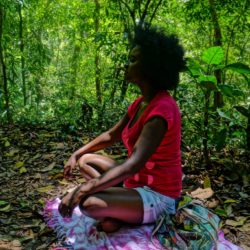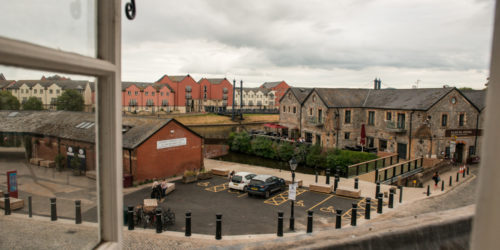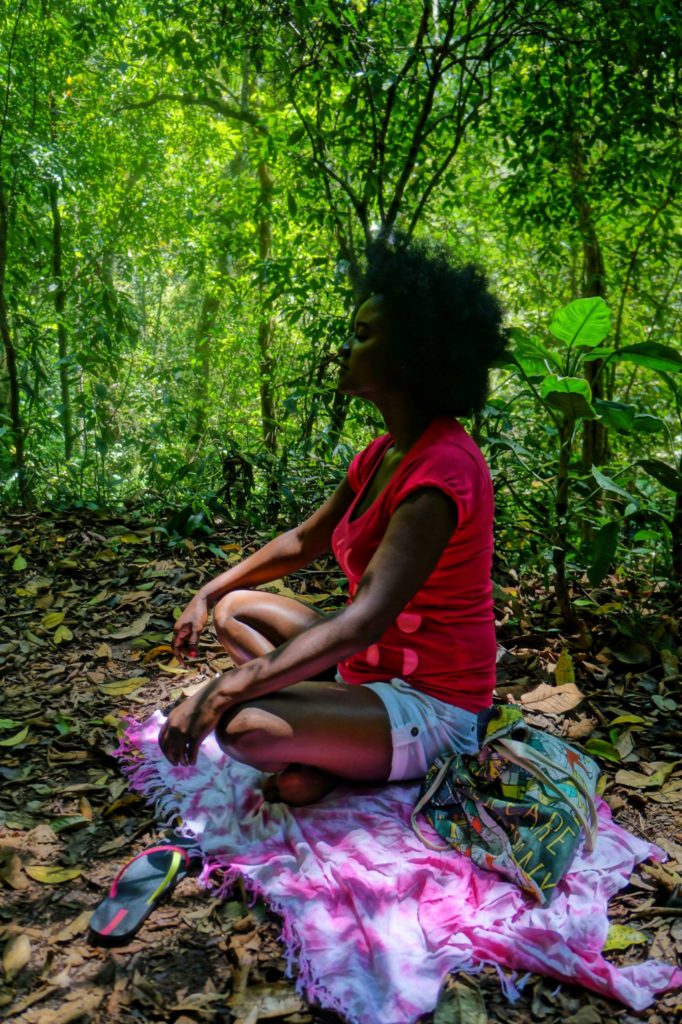Across her four week residency, Quay Words Summer digital writer-in-residence Tjawangwa Dema wrote a series of blog posts exploring the various aspects of the residency. Here, she considers what it means to experience a place and how this impacted her residency.
Then I’m walking in Memphis
Walking with my feet ten feet off of Beale
Walking in Memphis, but do I really feel the way I feel
– Walking in Memphis, Marc Cohn
I was walking in Bristol, on a day so still and warm and humid that ants might take to the sky as they do every so often in nuptial flight. But on this day the quiet served not only myself but what might have been a dusky slug that I watched cross a wide park walkway undisturbed by the usual crowd of bicyclists and beautiful babies trying to stay upright on the uneven ground. And watching that slug’s slow and moist crawl I found myself thinking about not being able to walk around Exeter. We are all living differently in this moment but perhaps some ideas such as safety, belonging and longing for adventure are as old as time. Here I was with no more than 6 or 7 other people scattered around a decent sized park with its abandoned paddling pool wondering if one could truly get to know a place without meeting its people.
And being, broadly speaking, in the land of Shakespeare I summoned dusty old Sicinius from his Coriolanus to ask ‘what is the city but the people?’.
Well Sicinius, I’m glad you asked. Just like the citizens who offered their ‘True, the people are the city’ in response, so do I. To begin with, a city is certainly its people, their lived experiences, their built environment, their political choices and so on but it is also of course made up of its other-than-human inhabitants, its creatures great and small as well as its natural architectures.

One of my most favourite ways to relax is walking but this appreciation is hard-won. Being Motswana I don’t come from a nation of people who commonly walk for leisure (everything I’m sure, to do with the heat, work, time and infrastructure). Now here I am surrounded by green spaces and constant talk of wellbeing. This way of thinking is hardly unique to these isles. After all the integration of nature into other knowledge systems is a practice common to lots of indigenous ways of being. For example, in Botswana to hear the word ‘June’ in Setswana is to hear the phrase ‘do not visit at night’ (Seetebosigo) because it is the coldest month of the year; to hear August – my birth month- is to heed a warning that the winds blow so hard that they might break a tree open (Phatwe). October has to do with how young the impala are in that month and by extension a hunter might take that into consideration, and so on.
Thinking about nature is a useful lens through which one can think about human nature; is an injury to nature an injury to all? Whose desires matter, who’s treated with disdain? Who’s wrong or wise, who deserves benevolence and access? Who doesn’t belong or only belongs if they ‘belong’ to the other? I’ll not get into the provocative complexities of Aldo Leopold’s ‘land ethic’ but I was quite excited in 2017 when after 140 years of negotiation the Whanganui River in New Zealand was granted the same legal rights as a human being. My sense is that the Maori were not so much after ownership as they were translating an approximation of the relationship they have always had with the river into terms the world could understand.
‘Which means that a place is a story, and stories are geography, and empathy is first of all an act of imagination, a storyteller’s art, and then a way of traveling from here to there.’
-Rebecca Solnit, The Faraway Nearby
This is a purposefully broad first blog, my residency is but a few days old. I’m a wide-eyed stranger in your regional midst. For me, being a responsible literary citizen usually means proximity as part of my attentiveness but I’ve undertaken this residency during a pandemic and being responsible now means maintaining some distance. Despite the residency being digital I want to find ways to speak to the part of my engagement that says ‘in-residence’.
I want to ask the guy in The Hourglass where he thinks I should spend my afternoon. I want to see the Exeter Book; imagine who might have thought it a suitable chopping board in its long history. Being faraway but nearby I want to mediate distance through technology but most importantly I still want to ‘meet’ the people of Exeter. I want them to ‘show’ me their city beyond official ‘things to do’ websites. One way I think they can do this is by looking out their windows and telling me a story.

To accomplish this sideways but legitimate familiarity with Exeter there’ll be interviews with locals, meet-the-writer sessions, as well as a public reading. To contribute to my ‘Place and the Personal’ project see submission guidelines here – no special skills or previous experience required just a dollop of enthusiasm.
I accepted this residency as digital because I have faith in imagination, I trust that together we (you, me, the internet, books, questions) can approximate a lived experience. It’ll never be the sound of the 07:37 pulling into St Davids, or the feel of grass underfoot in Killerton. It’s not quacks at the quay or sniffing the air near SecAnim on a hot summer day. It’ll never match walking into the past at St Nicholas Priory or rain on your collar enroute to see the Chiefs play but …a poem is perhaps more interested in affect than precise re-enactment. While it is invested in imagery and movement, it reaches in equal measure for ‘the way you feel’ as it does for any concrete thing. It hopes the slowly observed and specific will somehow translate as urgent and universal. Not a record but a happening that is revivified each time it encounters a reader.
